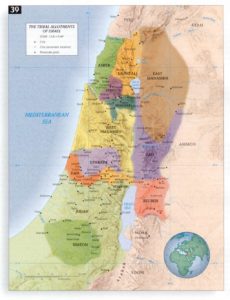One of my favorite stories in the Old Testament is about Moses and the Israelites’ exodus and their 40-year journey into the Promised Land of Canaan. They persevered and Moses led them. Joshua was chosen to lead the final way into the Promised Land.
What would normally have been an 11-day trip took 40 years as they wandered into the wilderness.
Recently I discovered an added twist to the plot of this story that I continue to ponder.
What I did not realize is that about 15 months into the journey from Mount Sinai to the Promised Land of Canaan all the Israelites landed in Kadesh Barnea. Remember when the 12 spies surveyed the Promised Land (Numbers 13)? Their home base was Kadesh. It was at the base of the Promised Land of Canaan. It had a water supply, livestock and vegetation there. They had “just enough.” They had found complacency without the fruitfulness of the Promised Land.
“And the time from our leaving Kadesh-barnea until we crossed the brook Zered was 38 years, until the entire generation that is, the men of war, had perished from the camp, as the Lord had sworn to them. For indeed the hand of the Lord was against them, to destroy them from the camp, until they had perished.” –Deuteronomy 2:14-15.
In fact, two and one-half tribes—the tribes of Gad, Reuben and half of Manasseh—liked Kadesh Barnea so much there they CHOSE to settle east of the Jordan and not go into the Promised Land! What?
The beginning of the journey from Mount Sinai to Kadesh was swift and jubilant. Sad doubt and delay soon followed. Israelites were hesitant and plunged down into wasted years of wandering in the wilderness.
Moses interceded for them over and over.
The Israelites were only 11 days from the land of promise! But they turned back. They could have made 11 days of progress. Instead they chose 40 years of wandering.
The wilderness is not the barrier to the Promised Land.
Wandering in the wilderness is the barrier to the Promised Land.

The Promised Land “Canaan” Allotment of Land Among the Twelve Tribes of Israel. Note that Reuben, Gad and half of Manasseh settled to the right/east of the Jordan.
Kadesh Barnea is a beautiful oasis. Ruins of the ancient city can be found today.
Kadesh could even be considered to be an “Oasis of Complacency.”
Kadesh is where Moses struck the rock and water gushed out. Moses’ patience had worn thin. The Israelites had complained about everything. In a fit of anger Moses called them rebels and struck the rock instead of speaking to it. Water gushed out . God was faithful and kept His promise, even though Moses disobeyed. Because of striking that rock, Moses was not permitted to enter the Promised Land. He was able to see it from a distance before he died at 120 years old.
“Then Moses went up from the plains of Moab to Mount Nebo to the top of Pisgah, which is opposite Jericho. And the Lord showed him all the land, Gilead as far as Dan, all Naphtali, the land of Ephraim and Manasseh, all the land of Judah, as far as the western sea…This is the land of which I swore to Abraham, to Isaac, and to Jacob. I will give it to your offspring. I have let you see it with your eyes, but you shall not go over there. So Moses the servant of the Lord died there in the land of Moab…” –Deuteronomy 34:1-5
Can you imagine being so close to seeing your dreams fulfilled that you settle at the brink of your “Promised Land”?
What are some signs that you are settling in “Kadesh Barnea,” for less than your Promised Land?
- Your fear of risk outweighs your faith.
- You are satisfied and don’t want more
- Your passion wanes.
- Spiritual warfare seems to be quieted.
The enemy can’t destroy us but he will certainly try to distract. If the enemy is on your trail, you are still on God’s journey.
Friend, keep pursuing and persevering toward your Promised Land of dreams and God-sized vision on earth and toward heaven for eternity.
Editor’s Note: Printed in the September 2019 Edition of the “Charleston Mercury’s Carolina Compass.”
Resource:
–Priscilla Shirer teaching called “One in a Million.”








 Danya Jordan
Danya Jordan
The wilderness vs. wandering in the wilderness… thank you for such a great vision and important reminder!
Thank you, my friend. That means a lot! God is faithful. Love you.